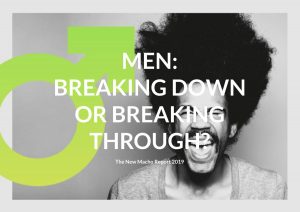
New research has shown that brands need to rethink how they market to men: many old-fashioned, views of masculinity are still prevalent, thanks in part to the stereotypes seen in advertising. It also highlighted that the supposedly more progressive millennials and Londoners are among the main culprits when it comes to perpetuating an unrealistic view of the role of men.
One in seven UK males (14%) think that ‘real men don’t cry’, jumping up to 27% of those in London. Meanwhile an astonishing 15% still think women should do the larger share of the cooking and cleaning in a relationship, rising to 19% among millennials (men aged 22-37) and 22% of men in London.
In addition, more than a quarter (27%) of men believe they should be the main financial providers for their family, rising to nearly half (43%) of men in London. In addition, one in six (17%) still think that for men to show vulnerability is a sign of weakness.
And despite the growing call for more attention to mental health among men, a quarter of males (25%) still hold to the view that ‘real men don’t crack under pressure’ – rising to 37% among millennials and 41% of Londoners.
The survey of 2,000 UK adults, both men and women, was commissioned by New Macho, the specialist men’s marketing arm of the brand and cultural transformation agency BBD Perfect Storm. It also revealed that millennials are the most materialistic age group of men: 42% say brands and labels reflect a person’s status (compared to the UK average of 27%), while 46% say ‘you have to dress to impress to get ahead in life’, versus a UK average of 35%.
In addition, a third of millennial males (31%) believe the attractiveness of their partner reflects their social status and a quarter (27%) think that popularity on social media makes them more desirable. When buying products, men overall are almost twice as likely than women to think about what the brand name/label says about them.
New Macho managing director Fernando Desouches comments: “The groups that are most likely to hold these stereotyped views of masculinity – Londoners, millennials and high earners – are also the most likely to feel depressed or sad, according to our responses. With this high correlation, these beliefs may be having a very real and negative impact on men’s mental health. The ad industry has to accept some of the blame for this, as we’re still portraying men either as aloof and hyper-competitive or as dorks and figures of fun. It’s all just gender stereotyping, which the ASA is rightly working to eradicate.”
However, there is an opportunity for brands: the research also highlighted that many UK men are looking for a more sophisticated approach to masculinity. This was reported by three-quarters (73%) believe men should talk more about their feelings; 75% believe that ‘being a great father means always being there’; and 83% are of the view that fathers should support their children in whatever choices they make in life.
The surveyed UK adults were also asked which British celebrity they feel best represents the ‘modern man’ – Prince Harry came first with 28%, followed by David Beckham on 25% and Idris Elba with 18% of the vote.
Fernando adds: “In the same way that brands like Dove helped to change how advertisers portray women, there has to be a transformation in how brands market to men. Sadly, many of their current campaigns swing between two stereotyped expressions of masculinity: the emotionally distant ‘successful’ man or the always vulnerable and emotional progressive male. Instead, brands need to start using their ads and marketing to portray the subtlety, nuance and range of the modern male experience if they want to engage this changing audience and avoid obsolescence.”
More information on the research is available from New Macho’s in-depth report, downloadable here. Other findings included:
- Two-thirds (66%) of all UK adults think ‘knowing how to use tools to repair things’ is a masculine trait
- Only 7% see helping to nurture children as a male trait
- Women are more likely than men to want to see more ads featuring men in non-stereotyped roles (57% of women vs. 47% of men)
Source: BBD Perfect Storm

You must be logged in to post a comment Login